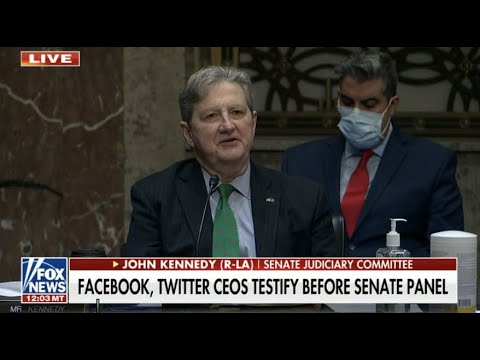Kennedy Grills Tech CEOs: “Get Out of the Censorship Business; People Aren’t Morons; Let People Decide What to Believe” If Not You’re A Publisher
WASHINGTON, D.C. – At a Senate Judiciary Committee hearing Tuesday entitled “Breaking the News: Censorship, Suppression, and the 2020 Election,” Mark Zuckerberg and Jack Dorsey – CEOs of Facebook and Twitter, respectively – were questioned at one point by Louisiana Senator John Kennedy on censorship and content moderation on the two powerful social media platforms.
The hearing was a continued look at possible reform of Section 230 of the Communications Decency Act – which currently does not hold internet service providers responsible for the content of third-party users – and how it would affect the concept of free speech on the internet.
Kennedy, a former Democrat turned Republican, at first complimented the two CEOs, stating that he was “proud of the fact that it was American ingenuity” that lead to their success; success, Kennedy said, that also lead to Twitter and Facebook possessing incredible power.
Both Democrats and Republicans have accused Twitter and Facebook of actively engaging in censorship of certain information and viewpoints on their social media platforms, an opinion that Kennedy reiterated to Zuckerberg and Dorsey.
“The Democrats want you to publish things on your platforms that they agree with, and they don’t want you to publish things that they don’t agree with,” he said. “This point of view also holds that the Republicans are upset with you because want you to publish things on your platforms that they agree with, and they don’t want you to publish things that they disagree with.”
Kennedy then went on to propose a hypothetical new rule set that both Twitter and Facebook could adopt in regards to avoiding censorship and keeping the platforms a place where free speech could thrive for all.
“This is a question, not a suggestion. What if both of your companies had a rule that said, okay… people aren’t morons. I would like to treat people as they treat me. I can read what I want to read and exercise my own good judgment about whether I choose to believe it,” he said. “So here’s the rule: If you go on Twitter or Facebook, you can’t bully people, you can’t threaten people, you can’t commit a crime with your words, and you can’t incite violence. But other than that, you can print any damn thing you want to, and we’ll let our users judge. Give me your thoughts on that.”
“Those are generally the rules that we have,” Dorsey responded. “Our focus on these policies-“
“No you don’t, Mr. Dorsey,” Kennedy said, cutting him off. “You’re censoring right and left, trying to make both sides happy, and you’re making neither side happy.”
Kennedy then asked Zuckerberg for his thoughts, who said that he agreed with the proposed new rules in principle, but added that there are more categories of harm than the ones the Senator initially laid out.
“Even the most ardent First Amendment supports agree that you shouldn’t be able to yell ‘fire’ in a crowded theater if there’s not actually a fire,” Zuckerberg said. “For example, we’re in the middle of a pandemic and misinformation about COVID could put people at greater risk in getting the disease.”
“I’m not saying you’re wrong by doing what you describe,” Kennedy replied. “But that makes you a publisher, and that creates problems with Section 230. At some point, we need to trust people to use their own good judgment to decide what they choose to believe.”




Comments are closed.